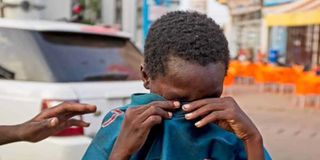Dar es Salaam leads in number of street children

What you need to know:
- Other regions, including Kagera, Geita, Kigoma, and Shinyanga, also report considerable numbers of children living and working on the streets.
Dodoma. Dar es Salaam has emerged as the region with the highest number of street children in Tanzania, followed closely by Dodoma, Mwanza, Mbeya, Arusha, and Iringa.
Other regions, including Kagera, Geita, Kigoma, and Shinyanga, also report considerable numbers of children living and working on the streets.
These alarming findings were shared by the minister for Community Development, Gender, Women, and Special Groups, Dr Dorothy Gwajima, during a press briefing yesterday.
The announcement came ahead of the National Day for Street Children which will be observed on April 12, 2025, with regional events across Tanzania, culminating in a national gathering in Mtwara.
Dr Gwajima stressed the government’s commitment to addressing the issue of street children, in partnership with development organizations.
One of the main focus areas is resolving marital disputes, with 16,095 cases handled by the country’s social welfare offices between July 2024 and March 2025. Of these, 2,555 cases were taken to court, while 10,423 were successfully mediated.
“Addressing these issues is crucial in reducing the number of children who end up on the streets,” Dr Gwajima explained.
Between July 2024 and March 2025, the government rescued 8,372 street children. Of these, 1,056 were placed in children’s homes and safe houses, 86 found refuge with trusted foster families, and the remaining were reunited with their families.
Furthermore, 1,346 rescued children received school supplies and other essentials. Forty-three children enrolled in vocational training, with 27 having graduated, and two are now volunteering at elderly homes.
Dr Gwajima also highlighted the government’s efforts to support survivors of gender-based violence and child abuse.
From July to December 2024, 27,479 survivors, including 15,040 children, were supported through police gender desks and social welfare officers at local councils.
The government continues to provide care services at two state-run children’s homes in Kikombo (Dodoma) and Kurasini (Dar es Salaam), which together house 253 children.
These homes offer education, healthcare, psychological support, and other essential services.





